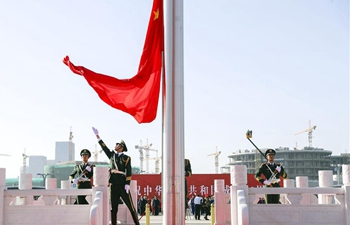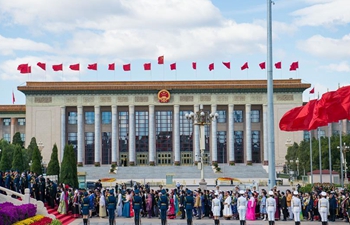SKOPJE, Oct. 1 (Xinhua) -- The turnout of Macedonia's referendum on the name agreement with Greece, based on the data on the website of the country's State Electoral Commission (SEC) after counting of all votes on Monday, was 36.91 percent -- below the 50 percent needed for the results to be considered valid in line with the constitution.
According to the SEC, of 666,743 people who voted in Sunday's referendum, 91.46 percent of votes were in favor of the deal, and 5.65 percent were against.
The referendum question they had to vote "for" or "against" read: "Are you in favor of EU and NATO membership by accepting the agreement between the Republic of Macedonia and the Republic of Greece?"
Macedonian Prime Minister Zoran Zaev declared on Sunday evening that the overwhelming support of voters for the name deal sent a clear sign that he should continue to push for adoption of the agreement in parliament, for which he will need the support of at least some opposition MPs.
The Social Democrats led Macedonian government in coalition with other smaller parties has the support of 71 out of the 120 Members of Parliament (MPs) and needs the support of nine more MPs from opposition.
On Monday, Zaev declared for the press that in a few days it will be known if it is possible to reach an agreement with the opposition VMRO DPMNE party for a two-third majority required in the parliament to pass the constitutional changes under the name agreement with Greece.
Zaev also underlined that the alternative was early elections in November.
The opposition VMRO DPMNE leader, Hristijan Mickoski, after the referendum closure, declared that the referendum failed and exposed the wrong policies of the government.
There is no announcement from Mickoski whether he would accept Zaev's call for early general elections in case there will be no adoption of the agreement in parliament.
On Monday, EU foreign affairs and security policy chief Federica Mogherini and commissioner for European neighborhood policy and enlargement Johannes Hahn in a joint statement declared that the overwhelming majority who voted at the referendum supported Prespes Agreement.
Mogherini and Hahn called this an historic opportunity not only for reconciliation in the region, but also for decisively moving the country forward on its EU path.
"It is for all political and institutional actors now to act within their constitutional responsibilities beyond party political lines," read the joint statement.
In Athens, the Greek Foreign Ministry said in a statement that Greece "remains committed to the Prespes agreement" aimed to resolve the name issue regarding the use of the term Macedonia.
"The results of the referendum in the Former Yugoslav Republic of Macedonia (FYROM)... are controversial.... Greece respects the choices of the citizens of FYROM," the ministry said.
Macedonia, formally called FYROM at the United Nations, is also the name of a northern province in Greece. Athens is worried that the use of the same name by the neighboring state could lead to territorial claims.
Following UN-mediated negotiations for years, the governments of Greece and FYROM reached a deal this June at Prespes Lake to put an end to the name row which had started in 1991. Under the agreement, FYROM's new name will be "Republic of North Macedonia".
The name row was the main obstacle Skopje had to overcome to make progress towards EU and NATO integration. Although the two governments promote the deal, there are still many people in both countries opposing it.













